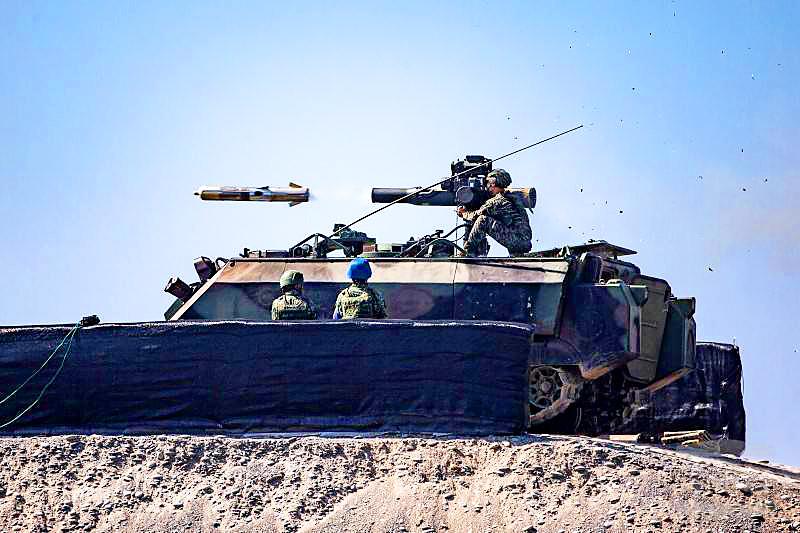Taiwan’s budget for this year’s purchase of 460 TOW 2B anti-tank missiles has been increased to NT$11.57 billion (US$398.91 million), up from an initial allocation of NT$11.36 billion, the Ministry of National Defense said yesterday.
The ministry did not disclose a reason for the increase.
The armed forces are to receive the TOW 2B Aero radio frequency-controlled anti-tank missiles in a shipment with 46 improved target acquisition systems, 46 Humvee vehicles and miscellaneous other equipment.

Photo courtesy of Military News Agency
Another batch of 1,240 missiles, 54 targeting systems and 54 vehicles is planned for 2024, which would complete the deal.
A defense ministry official said on condition of anonymity that the weapon systems would significantly boost the anti-armor capabilities of the nation’s armed forces.
The military uses older, wire-guided TOW 2A anti-tank missiles with inferior range that can veer off course if terrain features interfere with the wire, the official said.
The new missiles, which the US military first fielded in 2012, have an effective range of 4.5km and a top attack mode to target the top of armored vehicles, where they are most vulnerable, the official added.
The TOW 2B can hit a target within 23 seconds of being launched, which enhances the anti-armor team’s ability to rapidly deploy and engage armored vehicles, the official said, adding that possessing such weapons would help the nation deter would-be aggressors.

Taiwan is stepping up plans to create self-sufficient supply chains for combat drones and increase foreign orders from the US to counter China’s numerical superiority, a defense official said on Saturday. Commenting on condition of anonymity, the official said the nation’s armed forces are in agreement with US Admiral Samuel Paparo’s assessment that Taiwan’s military must be prepared to turn the nation’s waters into a “hellscape” for the Chinese People’s Liberation Army (PLA). Paparo, the commander of the US Indo-Pacific Command, reiterated the concept during a Congressional hearing in Washington on Wednesday. He first coined the term in a security conference last

Prosecutors today declined to say who was questioned regarding alleged forgery on petitions to recall Democratic Progressive Party (DPP) legislators, after Chinese-language media earlier reported that members of the Chinese Nationalist Party (KMT) Youth League were brought in for questioning. The Ministry of Justice Investigation Bureau confirmed that two people had been questioned, but did not disclose any further information about the ongoing investigation. KMT Youth League members Lee Hsiao-liang (李孝亮) and Liu Szu-yin (劉思吟) — who are leading the effort to recall DPP caucus chief executive Rosalia Wu (吳思瑤) and Legislator Wu Pei-yi (吳沛憶) — both posted on Facebook saying: “I

Sung Chien-liang (宋建樑), who led efforts to recall Democratic Progressive Party (DPP) Legislator Lee Kun-cheng (李坤城), was released on bail of NT$80,000 today amid outcry over his decision to wear a Nazi armband to questioning the night before. Sung arrived at the New Taipei District Prosecutors’ Office for questioning in a recall petition forgery case last night wearing a red armband bearing a swastika, carrying a copy of Adolf Hitler’s Mein Kampf and giving a Nazi salute. Sung left the building at 1:15am without the armband and covering the book with his coat. Lee said today that this is a serious

A court has approved Kaohsiung prosecutors’ request that two people working for Democratic Progressive Party (DPP) Legislator Lin Dai-hua (林岱樺) be detained, as a probe into two cases allegedly involving her continues. The request was made on Friday, after prosecutors raided Lin’s two offices and the staffers’ residences, and questioned five on suspicion of contravening the Anti-Corruption Act (貪汙治罪條例). The people included the directors of Lin’s Daliao (大寮) and Linyuan (林園) district offices in Kaohsiung, surnamed Chou (周) and Lin (林) respectively, as well as three other staffers. The prosecutors’ move came after they interrogated Lin Dai-hua on Wednesday. She appeared solemn following